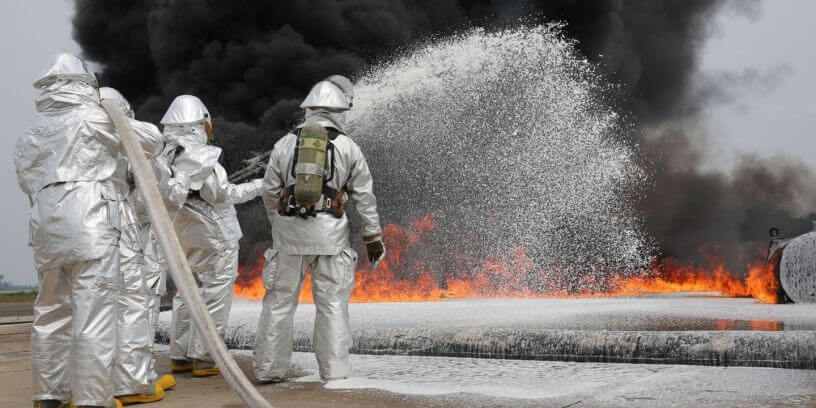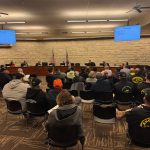13% of Wells Near JCI Site Have Elevated PFAS Levels
The company said a majority of wells had levels below state, federal threshold.

Marines fighting fires with foam, a product that uses PFAS . Photo by Lance Cpl. Shawn Valosin/U.S. Marine Corps.
A Marinette manufacturer of firefighting foam has reported that a majority of wells near farm fields in northeastern Wisconsin that it sampled had levels of PFAS chemicals below the threshold that federal officials say may be harmful to human health.
Tyco Fire Products, a subsidiary of Johnson Controls International, has been investigating the extent of PFAS contamination from its fire training facility in Marinette. The state Department of Natural Resources directed the company to sample farm fields in the region over a year ago, after the city of Marinette informed the agency that significant levels of the chemicals were found within biosolids at its wastewater treatment plant.
Tyco has denied responsibility for the contamination, saying other sources are likely.
Tyco conducted sampling of 183 wells on 61 fields in the Marinette and Peshtigo area. The vast majority, 94 percent, contained PFAS levels below the federal health advisory level of 70 parts per trillion, according to John Perkins, vice president of environment, health and safety for Johnson Controls.
The company also said 87 percent of wells had levels below the state’s recommended groundwater standard of 20 parts per trillion, and that 77 percent of wells had PFAS levels that were non-detectable or below levels that require reporting to the state.
“So very few wells had impacts in this 30-square mile area,” said Perkins.
Two-dozens wells, or 13 percent of those sampled, had PFAS levels that were either above the state’s recommended groundwater standard or the federal health advisory level. The company has provided bottled water to 22 well owners near farm fields with elevated levels of the chemicals.
The DNR has received the results of the investigation, according to Christine Haag, director of the agency’s remediation and redevelopment program.
“Our technical staff, including our hydrogeologist, and others will look into that report and analyze it and decide whether or not the DNR agrees with the report or whether or not we disagree with the conclusions, and we feel that additional work is necessary,” said Haag.
The company and agency disputed over the sampling process for months before Tyco began testing in March. Sampling was suspended shortly after due to the pandemic, but resumed in June.
Tyco has repeatedly insisted the DNR should examine other sources that may be responsible for the PFAS, while the agency has directed the company to expand sampling to assess the extent of contamination. The DNR has said state law does not require the agency to identify ever responsible party before beginning work to address contamination.
Most recently, Tyco refused to sample 500 private wells in an expanded area beyond its fire training facility. Now, the DNR plans to conduct sampling and recover costs from Tyco and Johnson Controls. Haag said the agency will be sending out informational packets to affected landowners in the next week that include agreements requesting access to conduct sampling.
Perkins said the company is working with the agency to discuss next steps after submitting the results of sampling.
“Overall, we think it is very much helpful to have a better understanding of what occurred out there in those biosolid fields,” said Perkins. “So again, we stand committed to the community, as our number one priority is clean, safe and reliable drinking water.”
The company has also spent millions to help the city of Marinette dispose of biosolids and update its sewer lines running to the city’s wastewater treatment plant. Tyco has also committed around $10 million to construct a municipal water line to provide safe drinking water.
Johnson Controls and Tyco were referred to the Wisconsin Department of Justice in May last year after failing to report any release of PFAS to the DNR when they first discovered them in 2013. Company officials have said they believed contamination had been confined to the site of its facility.
Tyco also notified the DNR last Thursday that it had detected an oil sheen on surface water in a ditch downstream from the company’s fire training facility. The ditch, called Ditch B, flows through the city of Marinette and into the Green Bay.
The sheen was traced to an upstream residential area, and Tyco paused treatment to avoid damage to its filtration system. Haag said the company collected samples for analysis.
“It’s my understanding that, as they’re waiting for results, the system will stay offline,” said Haag.
Perkins said the company has been removing as much of the sheen as possible, and the source of the oil is unknown.
“But, that system will be up and running here in a matter of a day or two this week,” he said.
Ditch B was found to have elevated levels of PFAS during sampling the company did in August, with levels of 1,000 parts per trillion for PFOA and 72 parts per trillion for PFOS.
Listen to the WPR report here.
Tyco: Majority Of Wells Near Farm Fields Show No Trace Of PFAS was originally published by Wisconsin Public Radio.
More about the PFAS Problem
- Gov. Evers and GOP Lawmakers Near a Deal on PFAS Pollution - Danielle Kaeding - Jan 22nd, 2026
- Gov. Evers Optimistic About Reaching Final Deal With Republican Lawmakers to Secure Release of $125 Million in Long-Awaited Pfas Investments - Gov. Tony Evers - Jan 21st, 2026
- Bipartisan Push to Tell Counties Faster When Water Tests Fail - Henry Redman - Dec 19th, 2025
- MKE County: County Seeks to Sue PFAS Producers, Oil Companies - Graham Kilmer - Dec 10th, 2025
- Wisconsin Reviewing EPA-Approved Pesticides For PFAS - Danielle Kaeding - Dec 9th, 2025
- State Nears Settlement with Johnson Controls/Tyco Over PFAS Spills - Danielle Kaeding - Dec 4th, 2025
- Senate Bill Promotes Soybean-Based Firefighting Foam to Replace PFAS - Danielle Kaeding - Dec 2nd, 2025
- Test Results Show High PFAS Levels in Wisconsin’s Landfill Runoff - Danielle Kaeding - Dec 2nd, 2025
- Wisconsin Communities Get $282 Million for Drinking Water Projects - Danielle Kaeding - Nov 19th, 2025
- Gov. Evers, DNR Announce $282 Million to Improve Drinking Water Quality for Wisconsinites in 74 Municipalities - Gov. Tony Evers - Nov 18th, 2025
Read more about PFAS Problem here




















